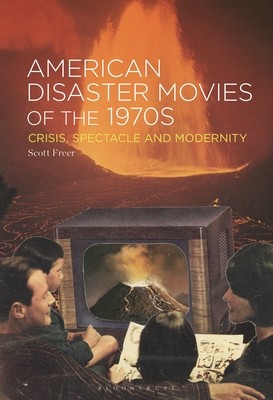
- We will send in 10–14 business days.
- Author: Scott Freer
- Publisher: Bloomsbury Academic
- ISBN-10: 1501336835
- ISBN-13: 9781501336836
- Format: 15.2 x 22.9 x 1.6 cm, hardcover
- Language: English
- SAVE -10% with code: EXTRA
Reviews
Description
The 1970's witnessed the 'golden age' of American disaster movies. This book defines the generic characteristics, such as ensemble acting and visual spectacle to place this dystopian genre within its immediate American context: the end of the civil rights and countercultural era, the Watergate crisis, and the defeat in Vietnam. Many of the themes dramatized by films such as Airport (1970) and The Towering Inferno (1974) anticipate present-day debates such as irresponsible and corrupt corporate capitalism, misplaced faith in science and technology, 'eco-collapse', political 'terrorist' threats, natural disasters, threatened and displaced populations, unwarranted suffering, plus other 'monstrosities of modernity'.
In American Disaster Movies of the 1970s, Scott Freer examines the 1970s' cultural phenomenon of the disaster movie genre, introducing a historicist perspective by placing the film genre within the immediate context of the 1970s American high modernity whilst engaging with relevant philosophical, theological and eco-critical ideas on evil, determinism, and human nature. The book contextualizes the 1970s disaster cycle by drawing on the longer cultural history of modernist reactions to modern anxieties including the widespread dependence on technology and corporate power. Freer explores the aesthetic theories of modern tragedy (i.e. the hubris of human fate and the aesthetic pleasure of exaggerated horror/terror on screen) as a means of explaining the power of disaster movies as a form of ethical criticism.EXTRA 10 % discount with code: EXTRA
The promotion ends in 19d.17:12:43
The discount code is valid when purchasing from 10 €. Discounts do not stack.
- Author: Scott Freer
- Publisher: Bloomsbury Academic
- ISBN-10: 1501336835
- ISBN-13: 9781501336836
- Format: 15.2 x 22.9 x 1.6 cm, hardcover
- Language: English English
The 1970's witnessed the 'golden age' of American disaster movies. This book defines the generic characteristics, such as ensemble acting and visual spectacle to place this dystopian genre within its immediate American context: the end of the civil rights and countercultural era, the Watergate crisis, and the defeat in Vietnam. Many of the themes dramatized by films such as Airport (1970) and The Towering Inferno (1974) anticipate present-day debates such as irresponsible and corrupt corporate capitalism, misplaced faith in science and technology, 'eco-collapse', political 'terrorist' threats, natural disasters, threatened and displaced populations, unwarranted suffering, plus other 'monstrosities of modernity'.
In American Disaster Movies of the 1970s, Scott Freer examines the 1970s' cultural phenomenon of the disaster movie genre, introducing a historicist perspective by placing the film genre within the immediate context of the 1970s American high modernity whilst engaging with relevant philosophical, theological and eco-critical ideas on evil, determinism, and human nature. The book contextualizes the 1970s disaster cycle by drawing on the longer cultural history of modernist reactions to modern anxieties including the widespread dependence on technology and corporate power. Freer explores the aesthetic theories of modern tragedy (i.e. the hubris of human fate and the aesthetic pleasure of exaggerated horror/terror on screen) as a means of explaining the power of disaster movies as a form of ethical criticism.

Reviews